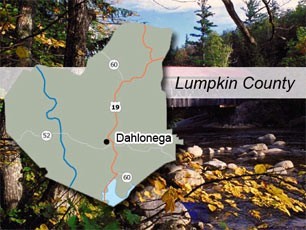DAHLONEGA - City officials and key project leaders hosted a groundbreaking ceremony recently to mark the beginning of work on Dahlonega's new water treatment project.
The plant will be the first in Georgia and one of only a few in the Southeast to use a new "membrane filtration" technology that, city officials say, significantly increases water quality and allows for more cost-effective facility expansions than conventional water treatment processes.
Work actually began at the site on Morrison Moore Parkway just north of the Yahoola Creek Reservoir in May, after four years of intense planning and preparation. Grading also has been in progress nearby at the intersection of Morrison Moore Parkway and Wimpy Mill Road directly across from the reservoir, where transmission lines will be laid to move water into and out of the plant.
The $26 million project, including the water plant and distribution system, is slated for completion in January 2010. The city's existing water treatment plant, built in 1976, is fast approaching the 1.2 million gallons-per-day limits of its permitted capacity.
"This water treatment plant is going to be a tremendous community asset, serving both city of Dahlonega customers and public water customers in the county through an agreement with the Lumpkin County Water & Sewerage Authority," City Manager Bill Lewis said. "The new plant also will make the city more competitive in attracting industry to the community."
Planning for the new water treatment plant began with the development of a water and sewer master plan. A carefully planned financial strategy that included a revenue bond and anticipated Special Purpose Local Option Sales Tax funds enabled the city to move forward with engineering, permitting and finally, construction.
"This is a monumental occasion," said Mayor Gary McCullough, calculating that he will be 106 years old before the city needs another new water plant. "This is the largest project ever undertaken by the city."
The significance of the project was evidenced by the several dozen guests in attendance, who represented a host of local, state and federal agencies and offices.
Assuming moderate population growth, Lewis said the plant initially will be capable of providing up to 4 million gallons of water per day (MGD). That should carry the city about 15 years into 2025. At that point, a planned expansion would provide 6 MGD through mid-century, 2045 to 2050, when the plant will be expanded for the last time to 10 MGD.
The innovative membrane filtration technology will make these planned expansions very cost effective, Lewis explained, because expansions will be accomplished by adding filters rather than with bricks and mortar construction. The facility will be built to accommodate additional filters as water demands increase.
Friday
October 11th, 2024
10:18AM









